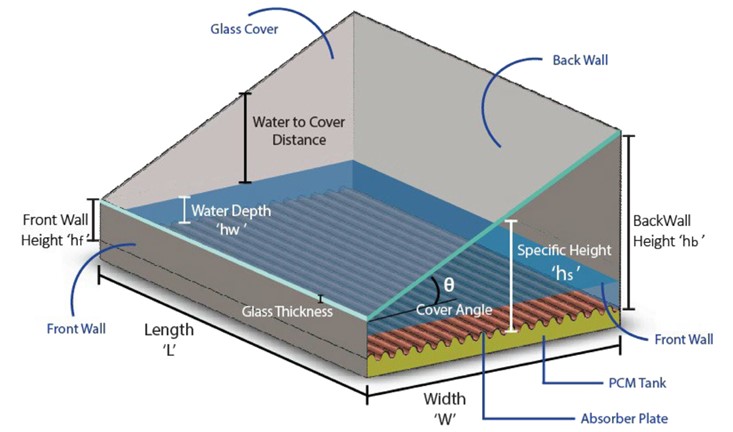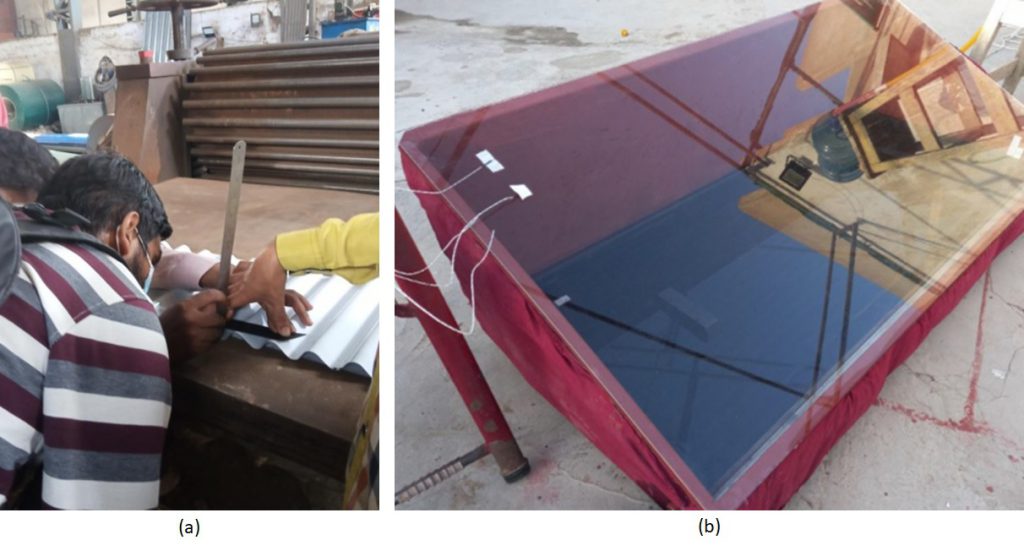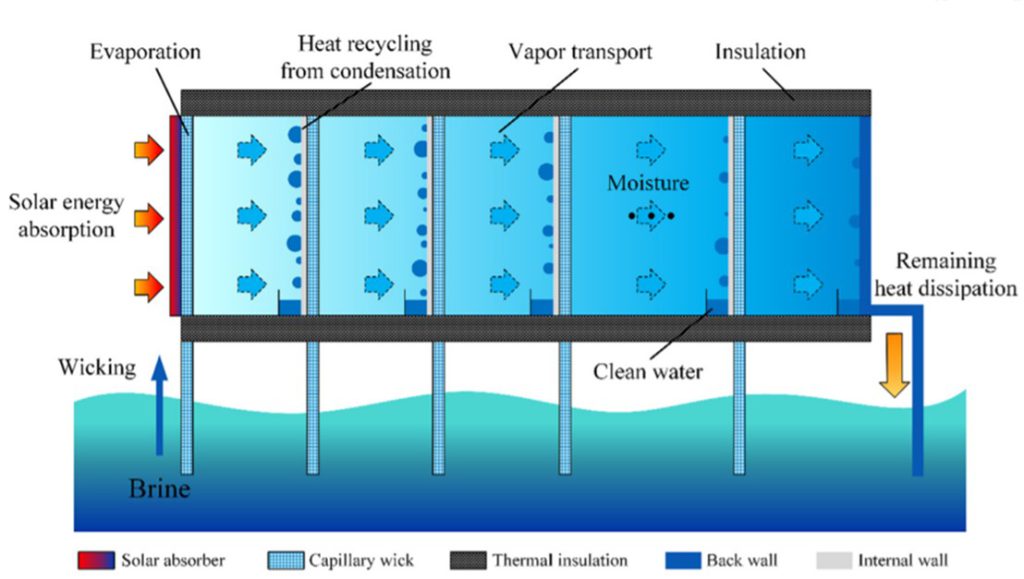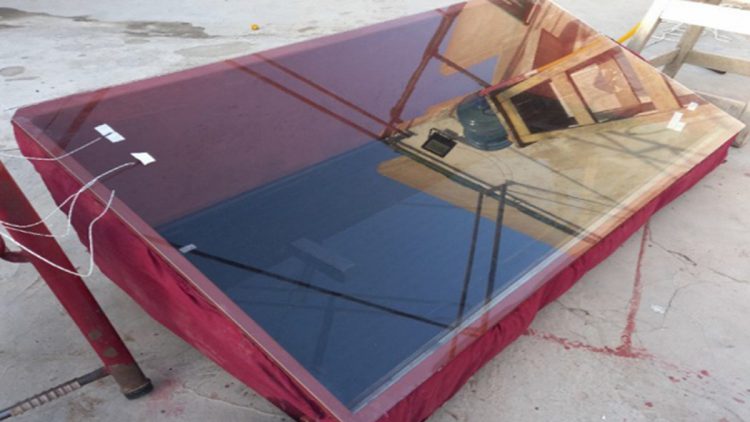The global freshwater use has increased by a factor of six over the past 100 years [1] and according to the United Nations [2] over two billion people live in countries experiencing water stress. Climate change is making matters worse. As an example, despite a massive deluge in Southern Pakistan in the summer of 2022, Mangla dam was still half-empty [3] as there was no rainfall in the northern catchment areas of the dam. The floods have also created an acute shortage of drinking water (or fresh water) in flood affected areas as the rivers and lakes are polluted by sediments and salts.
One solution: convert brackish water into drinkable water by using only the heat from the sun i.e. a solar still. Despite being one of the cheapest and environment-friendly methods of desalination, solar stills, however, suffer one major flaw: low productivity [4]. Students and researchers led by Dr. Antash Najib at the Sustainable Energy Efficiency Knowledge lab (SEEK lab), PNEC NUST, Karachi are helping change that.
In 2021, a team at SEEK supervised by Dr. Asad Zaidi and composed of Hamza Ahmed and his classmates* collaborated with Dr. Bumbjoo Kim at the Kongju National University, Korea to model, design and field test an advanced portable solar still with a corrugated absorber and phase change material (PCM). The still was able to produce 4.5 L/day while costing less than 4.4 PKR per liter [5].

There are several reasons for this high performance at such a low-cost. Firstly, during daytime, the excess solar heat is stored instead of being wasted i.e. it melts the phase change material (paraffin wax) located under the absorber plate. Overnight this wax solidifies, releasing its heat and evaporating the water in the still. Thus the still produces fresh water, even during night-time. Secondly, the corrugated plate (Figure 2 (a)) was specifically designed by Yasir to provide maximum productivity for the Southern region of Pakistan. Last, yet most importantly, Taha, Mustafa and Talha varied different parameters of the design (including the materials to be used) until a design that produces the maximum fresh water at the lowest cost was found (i.e. rigorous optimization).

In 2022, another team at SEEK lab has taken solar desalination to the next level by fabricating possibly Pakistan’s first and only parallel plate Vertical Diffusion Solar Desalination (VDSD) system. In conventional solar stills the vapors evaporate from the bottom surface and condense on the inclined upper surface of the still. In VDSD, condensation and evaporation take place on two sides of the same plate (as shown in Figure 3). Thus unlike a conventional still, in a VDSD system the latent heat of vaporization is not wasted and the heat released by the water condensing on one side of the plate is used to evaporate the water (in a wicking material) on the other side. Multiple sets of plates are repeated to complete the system.

The SEEK team designed the VDSD system using low-cost and locally sourced components. Preliminary results indicate that the system can produce water at a cost less than one-third of that of the previously fabricated solar still. SEEK is actively pursuing collaboration with industrial and NGO partners that can help further develop and deploy these technologies to promote sustainable development in Pakistan as well as the rest of the world.

Team Members:
- Hamza Ahmed
- Undergraduate student (former) Sustainable Energy Efficiency Knowledge (SEEK) lab, PNEC NUST, Karachi
- Masters Student: Department of Design and Manufacturing Engineering, School of Mechanical and Manufacturing Engineering (SMME), National University of Sciences and Technology (NUST), Islamabad.
- Email: hahmed.dme21smme@student.nust.edu.pk
- Yasir Anas
-
- Undergraduate student (former) SEEK lab, PNEC NUST, Karachi.
- Masters student: Department of Mechanical Engineering, NED University of Engineering and Technology, Karachi
- Email: yasiranas@gmail.com
-
- M. Taha
- Undergraduate student (former) SEEK lab, PNEC NUST, Karachi.
- Email: mtaha_16@hotmail.com
- Talha Umair
- Undergraduate student (former) SEEK lab, PNEC NUST, Karachi.
- Email: umairtalha16@gmail.com
- Mustafa
- Undergraduate student (former) SEEK lab, PNEC NUST, Karachi.
- Masters Student: Department of Engineering, University of Ottawa, Ottawa, Ontario, Canada.
- Email: Mmust053@uottawa.ca
References:
[1] UNITED NATIONS WORLD WATER DEVELOPMENT REPORT 2021: valuing water. S.l.: UNITED NATIONS EDUCATIONA, 2021.
[2] “Progress on Transboundary Water Cooperation – Global baseline for SDG indicator 6.5.2,” UN-Water. https://www.unwater.org/publications/progress-on-transboundary-water-cooperation-652/ (accessed Jan. 24, 2022).
[3] “Mangla Dam may miss touching maximum level,” The Express Tribune, Sep. 18, 2022. https://tribune.com.pk/story/2377214/mangla-dam-may-miss-touching-maximum-level (accessed Oct. 20, 2022).
[4] H. Nassrullah, S. F. Anis, R. Hashaikeh, and N. Hilal, “Energy for desalination: A state-of-the-art review,” Desalination, vol. 491, p. 114569, Oct. 2020, doi: 10.1016/j.desal.2020.114569.
[5] H. Ahmed, A. Najib, A. A. Zaidi, M. N. Naseer, and B. Kim, “Modeling, design optimization and field testing of a solar still with corrugated absorber plate and phase change material for Karachi weather conditions,” Energy Reports, vol. 8, pp. 11530–11546, Nov. 2022, doi: 10.1016/j.egyr.2022.08.276.
The author is Assistant Professor and Director at SEEK lab, Pakistan Navy Engineering College (PNEC), National University of Sciences and Technology (NUST). He can be reached at antash.najib@pnec.nust.edu.pk.
Researcher Profile: https://bit.ly/3DFbwef

![]()





